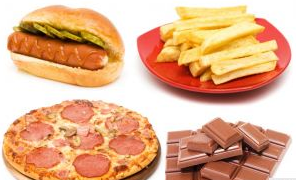You’ve heard of french fry fanatics, pizza bugs and chocoholics. Are those who crave such fare simply looking forward to indulging comfort food, or are they “addicts” jonesin’ for a fix?
A recently released University of Michigan (U-M) study may shed some light on the question. It confirms that french fries, pizza and chocolate are among the “most addictive” foods one can eat. According to a post on the Ann Arbor school’s website, this is one of the first studies to examine specifically which foods may be implicated in “food addiction.”
Results from previous animal research concluded that highly processed foods, or foods with added fat or refined carbohydrates (such as sugar or white flour), may be capable of triggering addictive-like eating behavior. Clinical studies in humans have observed that some individuals meet the criteria for substance dependence when the substance is food.
 Despite the fact that highly processed foods are generally known to be quite tasty and preferred among many consumers, it is unknown whether these types of foods can elicit addiction-like responses in humans. Nor is it known which specific foods produce these responses, according to Ashley Gearhardt, a U-M assistant professor of psychology and co-author of the study, entitled: Which Foods May Be Addictive? The Roles of Processing, Fat Content, and Glycemic Load.
Despite the fact that highly processed foods are generally known to be quite tasty and preferred among many consumers, it is unknown whether these types of foods can elicit addiction-like responses in humans. Nor is it known which specific foods produce these responses, according to Ashley Gearhardt, a U-M assistant professor of psychology and co-author of the study, entitled: Which Foods May Be Addictive? The Roles of Processing, Fat Content, and Glycemic Load.
Unprocessed foods, with no added fat or refined carbohydrates such as brown rice and salmon, were not associated with addictive-like eating behavior.
People with symptoms of food addiction or with higher body mass indexes reported greater problems with highly processed foods, suggesting some may be particularly sensitive to the possible “rewarding” properties of these foods, said Erica Schulte, a U-M psychology doctoral student and the study’s lead author.
“If properties of some foods are associated with addictive eating for some people, this may impact nutrition guidelines, as well as public policy initiatives such as marketing these foods to children,” Schulte said.
Nicole Avena, assistant professor of pharmacology and systems therapeutics at Icahn School of Medicine at Mount Sinai in New York City, and a co-author on the study, commented: “This is a first step towards identifying specific foods, and properties of foods, which can trigger this addictive response. This could help change the way we approach obesity treatment. It may not be a simple matter of ‘cutting back’ on certain foods, but rather, adopting methods used to curtail smoking, drinking and drug use.”
Future research should examine whether addictive foods are capable of triggering changes in brain circuitry and behavior like drugs of abuse, the researchers said.
More details about the research, published on Feb. 18, are available online in the current issue of PLOS ONE (http://journals.plos.org/plosone/article?id=10.1371/journal.pone.0117959).





